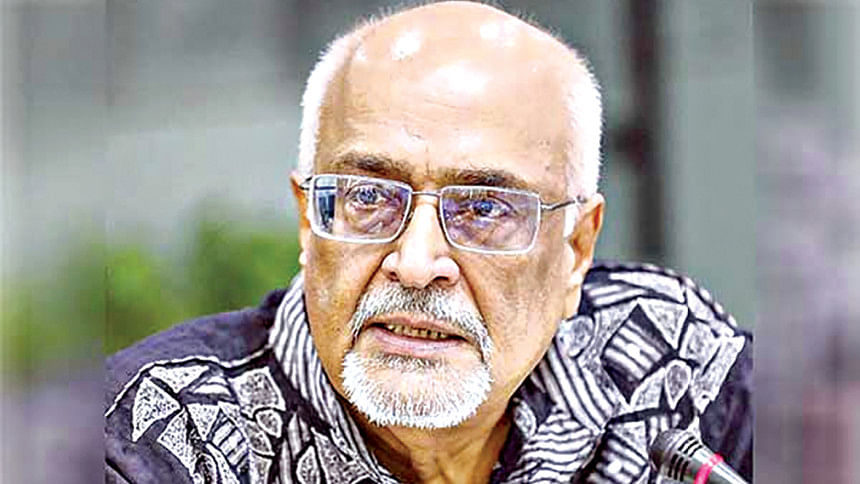The govt within the govt now clearly visible

There is a government within the current interim government, economist Debapriya Bhattacharya has said.
"It is now quite clear that the formal government we see has another government within it. This is no longer a secret -- it is clearly visible," said the CPD distinguished fellow while speaking at a roundtable titled "July Uprising: Experience of One Year and the Future" yesterday.
Bangla daily Prothom Alo organised the event at the newspaper's Karwan Bazar office.
He warned that the legitimacy of the interim government now hinges on proving its political neutrality, especially given growing doubts over its ability to hold a credible election.
"We didn't bring in an interim government for seat-sharing arrangements, we wanted a genuine election where people feel safe to vote, not just on the day of polling, but also the day after."
Debapriya raised concerns about worsening inequality, especially among marginalised groups, and the failure of this government to reflect its anti-discrimination commitment in economic reforms.
Calling for a clear exit strategy, he said the head of the interim government must clarify which reforms will be completed before leaving office.
"Now is the time to clean the desk. We need to know what will end, what will continue."
He added that without the active and extended involvement of the military, a peaceful and fair election may not be possible.
"The armed forces may need to stay on the ground for three to four months and lead disarmament. This can't be done with just the civil administration," he said, adding that ultimately, two key questions define this moment -- the neutrality of the government and its capacity to deliver.
This government has gone in the opposite direction of building an equal, democratic Bangladesh.
Prof Anu Muhammad said this government has gone in the opposite direction of building an equal, democratic Bangladesh. "People hoped for an end to autocracy, but that hope has been betrayed."
He added that while women, minorities, and workers actively joined the movement, they now face increased attacks and exclusion.
"The state's focus has shifted to striking long-term deals without public debate -- such as the Starlink agreement -- while ignoring urgent public demands like employment."
He said the government has prioritised only the Constitutional Reform Commission, sidelining other key reports, and is failing to meet people's expectations.
At the roundtable, Economist Hossain Zillur Rahman said the government must now be held accountable for its promises. "Sweet words and good intentions are not enough -- we need a ledger of what has actually been delivered on justice, reform, and elections."
Referring to the growing disconnect between policy elites and public expectations, he said, "We see a parade of paper-based qualifications, but a collapse in real capacity."
He criticised the ongoing institutional corruption and rising lawlessness, saying, "Even the police seem inactive now. There's social instability, youth unemployment, and violence. A silent frustration is growing.
"In the name of national consensus, decisions are made in isolation, excluding the public."
Senior Supreme Court lawyer Sara Hossain, said fear still pervades the judiciary, even a year after the July uprising. She said judges remain hesitant to issue orders or deliver verdicts in fear of backlash.
"In Bangladesh today, no one can say there is no fear. The judiciary is not free from it either."
"Judges constantly worry -- what if someone raises their voice against them? One outcry from a group and a judge's career could be over. Who will deliver justice in such an atmosphere?"
She criticised the sweeping arrests and vague charges filed after the uprising, saying many innocent people remain in jail.
Sara questioned the lack of transparency behind the removal of High Court judges and said the system discourages accountability.
At the discussion, writer Altaf Parvez said the past year has brought more bad experiences than good. The country has had to endure the pain of being under a government with limited or almost no capacity.
"This is the first time I've seen a culture of governance driven by Facebook trends.
"We've witnessed repeated surrender to populism. Across society, there's been a dangerous, tsunami-like rise of right-wing sentiment. Mob violence against dissenters has also increased."
Political analyst Zahed Ur Rahman said there is now no alternative to holding elections.
"We're in a strange situation -- we say we want democracy, but we're not allowed to want polls," he said.
"Right now, there are efforts to block or delay the election. Even if the country falls into chaos as a result, some people stand to benefit. But when there's no election in sight, the nation's character begins to erode."
Development economist Maha Mirza said anyone criticising anything following the July uprising is being labelled unfairly.
"If someone disagrees with the government or makes a comment about the National Citizen Party, those who supported the uprising are attacking them. This is unfortunate."
The event began with a one-minute silence in honour of those killed in the jet crash. Prothom Alo Executive Editor Sajjad Sharif moderated the discussion, where writer Farhad Mazhar, filmmaker Kamar Ahmad Simon, Prof Sayeed Ferdous, and researcher Sohul Ahmed, among others, spoke.

 For all latest news, follow The Daily Star's Google News channel.
For all latest news, follow The Daily Star's Google News channel. 



Comments